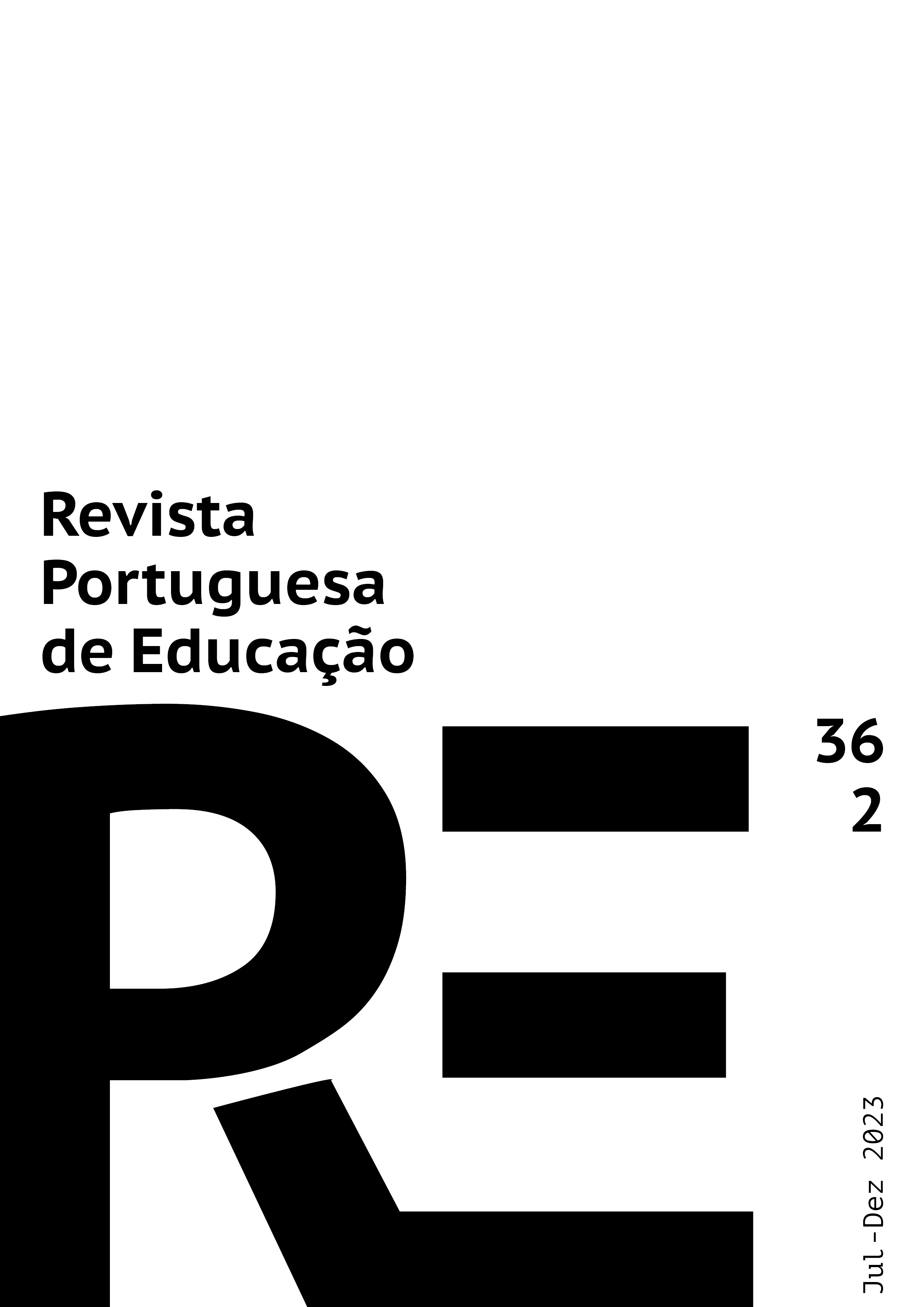Experimental education: Letters from Almeida Garrett to his daughter
DOI:
https://doi.org/10.21814/rpe.25510Keywords:
Experimental education, Education of women, Correspondence, GarrettAbstract
The text presents and analyses the private letters of João Baptista de Almeida Garrett (1799-1854) sent to his daughter Maria Adelaide, during the period when she was an internal student of the Salésias, between November 1853 and 1854. It is a set of 40 handwritten letters that remained unpublished until the publication of Correspondência Familiar (2012). Although these are private documents of an inviolable nature, when they are authorised for publication they take on historical value by reconstructing situations in the family sphere from an informal perspective rarely made known. In a direct and unpretentious style, the 40 letters are a genuine testimony of paternal love and a record of educational investment in the eighteenth century, not common in Portugal. Hence its significance for the pedagogical-political literature, scarce in domestic correspondence, which adds to the contribution to the understanding of what seems coherent in the Português liberal thought under the influence of romanticism: on the one hand, the correlation between illustration and civility; on the other hand, the unevenness of the demand for education according to gender. Knowing that Garrett wrote the letters 24 years after the publication of the book Da Educação (1829), we wonder about the confirmation of the ideological coherence in the transition from the generalized theoretical plan to the individualized practical plan.
Downloads
References
REFERÊNCIAS
Adler, M. (1982). The Paideia proposal: An educational manifesto. Macmillan.
Almeida, T. (1787). Methodo para a geografia. Oferecido às religiosas da visitação de Santa Maria de Lisboa. Na Oficina de António Rodrigues Galhardo.
Álvares, F. (1786). Breve compendio de grammatica portugueza para o uso das meninas que se educaõ no Mosteiro da Vizitaçaõ de Lisboa. Por huma religioza do mesmo Mosteiro. Na Oficina de António Rodrigues Galhardo. Beauvoir, S. (1949). Le deuxième sexe (vols. 1 e 2). Gallimard.
Cascão, R. (1993). A vida quotidiana e socialidade. In J. Mattoso (Ed.), História de Portugal (pp. 517-541). Círculo de Leitores.
Colaço, B., & Archer, M. (1999). Memórias da Linha de Cascais. C. M. Cascais e C. M. Oeiras.
Dewey, J. (1938). Experience and education. Collier Books.
Fernandes, R. (1985). Bernardino Machado e os problemas da instrução pública. Livros Horizonte.
Fumaroli, M. (1978). La lettre au XVIIe siècle. Revue d'Histoire Littéraire de la France, 6, 886-905.
Gama, J. (2005). Presença de Kant no panorama filosófico português. Cuadernos Salmantinos de Filosofía, 32, 321-334. http://www.publicaciones.upsa.es
Garrett, A. (1829). Da educação: Cartas dirigidas a uma senhora ilustre encarregada da instituição de uma jovem princesa. Casa de Sustenance e Stretch.
Garrett, A. (1844). Biografia. O Conselheiro J. B. de Almeida Garrett. Universo Pitoresco. Jornal de Instrução e Recreio, 19-21, 298-301, 307-312, 324-328.
Garrett, A. (1848). Memoria historica da excellentissima duqueza de Palmella, D. Eugenia Francisca Xavier Telles da Gama. Imprensa Nacional.
Garrett, A. (2012). Correspondência familiar. Imprensa Nacional-Casa da Moeda.
Lima, H. (1947). A filha de Garrett (Subsídios para a sua biografia). Biblos.
Lobo, F. R. (1992). Corte na aldeia. Introdução, fixação de texto e notas de José Carvalho. Editorial Presença. (original publicado em 1618)
Locke, J. (1693). Some thoughts concerning education. A. and J. Churchill.
Machado, F. (1993). Almeida Garrett e a introdução do pensamento educacional de Rousseau em Portugal. Asa.
Melo, F. (1971). Guia de casados. Editorial Verbo. (original publicado em 1651)
Pessoa, F. (1944). Poesias de Álvaro de Campos. Ática.
Rocha, M. (1995). O Real Colégio das Chagas do Convento das Ursulinas.
Instrução de meninas em Viana 1778-1884 [Dissertação de mestrado, Universidade do Porto].
Rousseau, J.-J. (1961). Émile ou De l' Éducation (1762). Garnier.
Sanches, R. (1922). Cartas sobre a educação da mocidade. Imprensa da Universidade de Coimbra. (original publicado em 1760)
Santos, Z. (2002). Percursos e formas de leitura "feminina" na segunda metade do século XVIII. Revista da Faculdade de Letras: Línguas e Literaturas, 19, 71-110. http://ler.letras.up.pt/site/default.aspx?qry=id04id19&sum=sim
Santos, Z., & Queirós, H. (2012). Letras e gestos: Programas de educação feminina em Portugal nos séculos XVIII-XIX. Via Spiritus: Revista de História da Espiritualidade e do Sentimento Religioso, 19, 59-122. https://ojs.letras.up.pt/index.php/vsp/article/view/3844
Sévigné, M. C. (2017). Recueil des lettres a Mme la marquise de Grignan, sa fille (nouvelle édition augmentée, tome 5). Hachette. (original publicado em 1754)
Teixeira, A. B. (2010). Sentido e valor do direito. Introdução à filosofia jurídica. Imprensa Nacional-Casa da Moeda.
Verney, L. A. (1746). Verdadeiro método de estudar, para ser útil à República e à Igreja: Proporcionado ao estilo, e necesidade de Portugal. Exposto em varias cartas, escritas polo R. P. * * * Barbadinho da Congregasam de Italia, ao R. P. * * * Doutor na Universidade de Coimbra (tomos I e II). Na Oficina de Antonio Balle.
Downloads
Published
How to Cite
Issue
Section
License
Copyright (c) 2023 Maria Teresa Santos

This work is licensed under a Creative Commons Attribution-ShareAlike 4.0 International License.
1. The authors preserve their authorship and grant the Portuguese Journal of Education the right to the first publication. The work is licensed under Creative Commons Attribution License that allows sharing the work with the acknowledgment of initial authorship and publication in this Journal.
2. The authors have the right to take additional contracts separately, for non-exclusive distribution of the published version of their work (e.g. to deposit in an institutional repository or as a book chapter), acknowledging the initial authorship and publication in this Journal.
3. The authors have the permission and are stimulated to post their work online (e.g. in an institutional repository or on their personal website). They can do this at any phase of the editorial process, as it may generate productive changes, as well as increase impact and article citation (see The Open Citation Project).
The work is licensed under Attribution-ShareAlike 4.0 International (CC BY-SA 4.0)




















